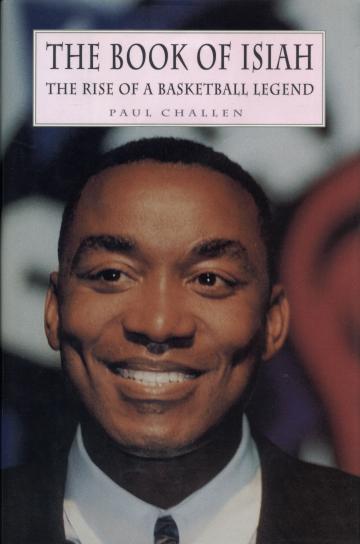By Paul Challen
![]()

![]()
Ranking: ![]()
I knew it was a bad sign when in chapter one, I was wishing I was through with the book. I always want to finish books, for the sense of accomplishment and to acquire knowledge, but this was different: I wanted to be done because I wanted to move on to a good book.
I picked up the book because I enjoy reading the late 80s Pistons. Thomas is indisputably one of the 5 greatest point guards in history (along with Oscar Robertson, Magic Johnson, Bob Cousy, and John Stockton). He won a NCAA championship, and 2 NBA championships, and was named to the 1980 Olympic team. That alone makes his life interesting. Toss in the amazing performances (16 points in 91 seconds, 1990 Finals MVP, etc), controversy (Larry Bird was only good because he's white), and the jobs (NBA legend on the court, GM of the Raptors), and I was looking forward to jumping in. So what went wrong?
First, this is not a biography, it is an homage, practically a love sonnet. It is written by a guy who sees no fault in Thomas. I believe the author is a Toronto journalist, and obviously a Raptors fan. The book was written right before the Raptors' 2nd season. In jocking the Raptors, Challen has to jock the man who runs the team. Look at the book's subtitle: "The Rise of a Basketball Legend." At the time the book was published, Thomas already was a basketball legend. Challen is trying to paint him to be the next Jerry West and Red Auerbach of the front office after a mediocre season on the job.
The first problem is that the book is incomplete. Challen lightly glosses over Thomas' first 7 NBA seasons, and really only spends significant time on the 1989 season. After a little more glossing, he jumps to Thomas' tenure with the Raptors. He never mentions any of his legendary scoring bursts, such as the 16 points in 91 seconds at the end of regulation of the deciding playoff game in the New York playoff series in 1984. He does go over the Larry Bird controversy and the all-star freeze out of Michael Jordan that Thomas orchestrated, and he mentions the 1992 Olympic snub, but never really dwells much on the background. He also never mentions how Thomas blocked the pay-per-view game between Jordan and Johnson, and how that came back to bite him in the Olympics.
Challen praises Thomas' every decision as Raptors' GM without stating the obvious: he screwed up on the hiring of Brenden Malone as coach. Had he spent more time interviewing Malone, then he would have learned that Malone did not share his vision on how to coach an expansion team. He never chastises Thomas on his blatant favoritism towards all-things Pistons, even when the people were unqualified. Because Thomas had a couple of endorsements, he makes it sound like Thomas was a savvy businessman ready to move into a GM role, rather than state the obvious: the owner went to Indiana University with Thomas and was star struck. It gets funnier in retrospect, as you see Thomas consistent failures since the book was written: he bankrupted the Continental Basketball Association after he purchased it. He failed as coach of the Pistons and Knicks and was a disaster as GM of the Knicks. His failures are so legendary that the satire website sportspickle.com wrote a story that George W. Bush had named Thomas as Michael Brown's replacement to head F.E.M.A. It is obvious that Thomas had done nothing to earn the responsibility to run a franchise, but Challen never ever considers this. (The parallels between Thomas and Jordan are eerily similar, and both were miserable failures in the front office.)
The next problem with the book is the editing. I assume "paycheque" is a Canadian spelling, and that is fine, but the book is full of editing errors and Challen cannot spell "offense" and "defense." Perhaps this is because he is the guy who holds the picket fence at the games.
It is obvious that
Challen is no basketball expert. He says that Thomas played in the Big 10
conference and then adds it is now known as the "Big 12". Um....
no. He says that Thomas was named NBA MVP three times. He was never
MVP. He writes the book in such simplistic terms that it seems as if his
audience has no clue about basketball, which maybe true -- I am guessing it was
written for Canadians who are not familiar with basketball, as a way of selling
the Raptors to the public. Furthermore, by deifying the head man of the
Raptors, the sell becomes easier. If this was his purpose, I hoped he
succeeded, because beyond context, the book is an unbelievable bore.
Introspection: N/A
Insight: 1
History: 1981-1997
Readability: 2
The Book of Isiah: The Rise of a Basketball Legend. Paul Challen. ECW Press. 1996.